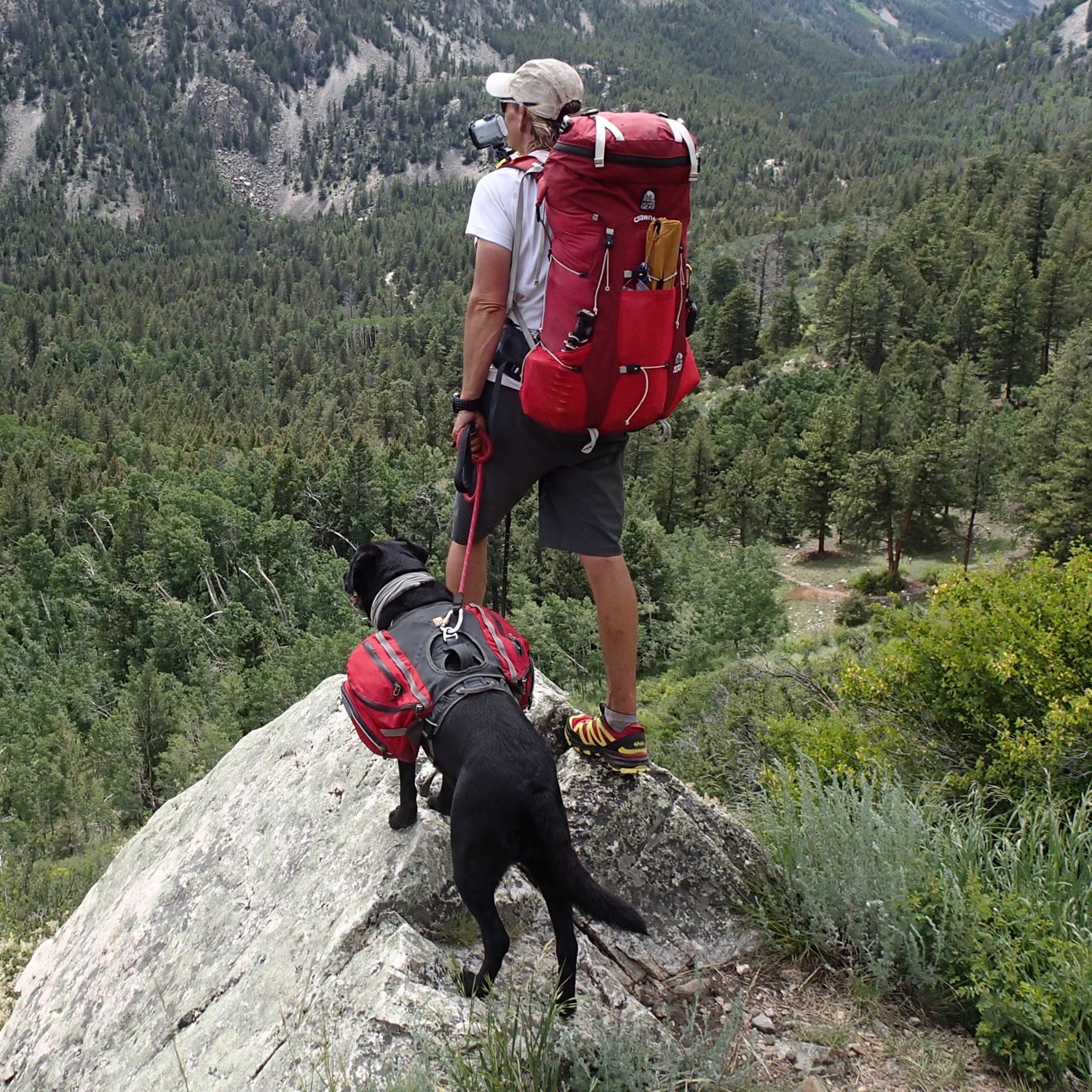Last weekend, long-distance hiker Trevor Thomas carefully padded along one of his favorite legs of the Appalachian Trail, a stretch that wends through Virginia’s Grayson Highlands State Park pocked with slippery rocks and treacherous tree roots. The park is known for its sweeping views of mini alpine peaks, scrubby hills, rocky outcroppings, and dense spruce fir forests. But unlike the other hikers who descended upon the park last weekend, Thomas had every mile of the trail mapped out in his mind—every fork, creek, and crossroad that could trip him up. He also didn’t see any of the beauty the other hikers saw. That’s because Thomas is completely blind.
When people on the trail stop to talk with Thomas, a trim 46-year-old who carries a trekking pole, wears wrap-around sunglasses, and is accompanied by his specially trained labrador, Tennille, shock is usually the first reaction. “When people find out I’m blind in the backcountry, they’re dumbfounded,” Thomas says. “I used to take it personally. But there was a time when I didn’t know blind people could do this either.” Though his hiking skills have progressed, he still says that “an average day is not knowing where I am probably 80 percent of the time.”
Thomas has always been an adrenaline junkie and avid outdoorsman. He started skiing at age three near his childhood home in Michigan at icy spots like Boyne Mountain, and by his late teens he was skiing out of bounds in the Colorado backcountry near Vail and Breckenridge. He also got into downhill mountain biking, jamming down singletrack in the summertime. Then he got into skydiving. “I liked speed and I liked the risk,” Thomas says.
At age 35, he started going blind.
“In eight months, I went from thinking I need glasses or contacts—because everyone in my family needed them—to losing my sight,” Thomas says. Doctors told him he had a rare eye disorder called atypical central serous chorioretinopathy, which leads to retinal detachment and, in some cases, blindness. The effects were irreversible. It was crushing for Thomas, who had just graduated from law school, and he fell into what he calls “a pit of depression” and anger. But even as his vision faded to black, he didn’t think his days of fresh mountain air or thrill seeking were over—until he talked to his newly assigned social workers.
“When I lost my sight, those in charge of helping me make the transition were saying, ‘You shouldn’t do that any more. You can’t. Bind people can’t do things like that,’” he says. “People were telling me there was nothing left to do but sit around and go to therapy meetings and hang out with other angry blind people.”
Thomas describes the attitude towards blind people as stifling and confining. “I was scared to leave my house because I kept getting hurt because I didn’t know how to navigate the world by myself,” he says. A friend suggested hiking as an outlet and a way to get back outside. “I was like, ‘It’s a little tame,’” he says. “But okay, I gotta have some sort of independence.” He threw himself into the sport completely, exploring the local trails with friends near his North Carolina home, stumbling, falling, and breaking his walking canes.
There’s no guidebook for hiking blind—no mile markers written in brail or gear section in REI for people with 0/0 vision—and Thomas didn't always have Tennille around (he got her in 2011, after a partner bailed on him for a hike in Colorado), so Thomas made it up as went along. For example, when he decided to hike the 2,190-mile Appalachian Trail, he spent 18 months preparing, making excruciatingly detailed mile-by-mile instructions and learning how to assemble and dissemble tents and cooking equipment and water filters by feel. Then, on April 6, 2008, he took off from the base of Georgia’s Springer Mountain, alone.
When other hikers were on the trail nearby, he’d listen for their footsteps and try to follow; when he was alone, he’d read the writing on trail signs by running his hand across the grooves. When he was lost, he’d wait until a hiker came by and ask them to verify his location and confirm he was walking in the right direction. It wasn’t easy: he fell a lot—he stopped counting after 3,000 times—and cracked ribs and stress-fractured his foot. “When I left, I looked at my life and said ‘I have absolutely nothing to comeback to if I don’t succeed,’” he says. He finished in six months.
“I went out originally to just reclaim my personal life,” he says. “I never dreamed that it could turn into something I can make a living doing.”
Thomas knocked out the 2,650-mile Pacific Crest Trail shortly after the AT. (He only fell 78 times along the way.) In an interview with Backpacker, he described standing atop Mt. Whitney like this:
The sound was incredible. It was like a vacuum, and I knew there was nothing above or beside me. Sheer openness. People ask me: Why climb if you can’t see what’s there? I can’t see the view, but I can feel it. I use my other senses to take in a mountaintop. I think of the smells, the wind, the sun on my face. That summit is the most beautiful thing I’ve ever felt.”
Today, Thomas is a professional long-distance hiker, who counts Clif Bar, Marmot, Arcteryx, and Ahnu Footwear among his sponsors. He has learned to echolocate by clicking his tongue, which helps him sense his surroundings. He can tell boulders from trees, forests from open trail. His heightened senses affect everything about his expeditions. This summer, he completed his most recent endeavor—the first blind thru-hike of the Colorado Trail, a 500-mile route across the Rockies from Durango to Denver. His , which he updates along the trail, is filled with posts about sponsors like Granite Gear backpacks and Ahnu Footwear. (Facebook even made an about following his hikes on the social media platform.)
Thomas hikes not just for the sponsorship dollars, but to help other blind people. He’s started a couple of programs to help blind kids explore the outdoors: one that in Massachusetts, another sends blind kids to . “It’s basically no holds barred,” he says. “They want to raft? We go rafting. They want to rock climb? We’ll rock climb.”
“Blind people are not blind until society and the system convince us we are,” Thomas says.
Next on the bucket list: the Grand Canyon rim-to-rim trail or maybe the 800-mile Oregon Desert Trail. For Thomas, hiking isn’t just about bagging peaks or logging mile markers. “It’s not just about the views, whether you’re sighted or not,” he told me. “When you do long hiking, it’s about the accomplishment. Can I deal with my problems? Can I deal with my broken gear? Can I endure?”


